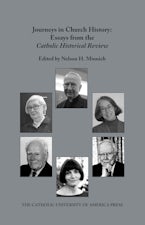Preparing your PDF for download...
There was a problem with your download, please contact the server administrator.
Martin Luther and the Shaping of the Catholic Tradition
Edited by Nelson H. Minnich and Michael Root
Imprint: Catholic University of America Press
When Martin Luther distributed his 95 Theses on indulgences on October 31, 1517, he set in motion a chain of events that profoundly transformed the face of Western Christianity. The 500th anniversary of the 95 Theses offered an opportunity to reassess the meaning of that event. The relation of the Catholic Church to the Reformation that Luther set in motion is complex. The Reformation had roots in the late-medieval Catholic tradition and the Catholic reaction to the Reformation altered Catholicism in complex ways, both positive and negative. The theology and practice of the Orthodox church also entered into the discussions. A conference entitled "Luther and the Shaping of the Catholic Tradition," held at The Catholic University of America, with thirteen Catholic, Orthodox, and Protestant speakers from Germany, Finland, France, the Vatican, and the United States addressed these issues and shed new light on the historical, theological, cultural relationship between Luther and the Catholic tradition. It contributes to deepening and extending the recent ecumenical tradition of Luther-Catholic studies.
Nelson H. Minnich and Michael Root are both ordinary professors at The Catholic University of America.
"A well-planned documentation of our era’s Catholic-Protestant exchanges, on topics of theological difference and ecumenical convergence, as well as on larger issues of the churches’ historical self-understanding in relation to the historic Reformation that Martin Luther initiated five hundred years ago."
~Jared Wicks, SJ, Pontifical Gregorian University, Rome
"This collection of articles is an insightful, nuanced, and multi-sided interpretation of Luther, Protestantism, and Roman Catholicism then and now in light of recent research and ecumenical dialogue. It asks hard questions and pursues complicated answers in light of a history now thankfully untainted by polemics and triumphalism."
~Christopher M. Bellitto, Kean University
"The essays in this collection combine exacting historical scholarship with rich theological reflection on the implications of Luther’s thought for the life of the church today. Indeed, because so many of the contributors are known not only for their scholarship, but also for their longstanding engagement in ecumenical dialogue, they bring into sharp relief both the challenge and the promise of Luther as a resource in the ongoing quest for ecclesial rapprochement."
~Ian A. McFarland, University of Cambridge
"What a fruitful way to recognize the unprecedented ripple effect of the 16th century reformer Martin Luther’s challenges to the Christian church and its fundamental teachings on grace, church and sacraments! Representing different church traditions from East and West, Europe and America, the ecumenically minded conversation partners provide a nuanced re-assessment of Luther in his original medieval context as well as of his actual impact in the Catholic tradition. Luther scholarship benefits greatly from the Catholic and Orthodox voices. The book demonstrates the value of respectful theological discourse and its promise for the current practices of the Christian faith in its different dialects and towards increasing mutual understanding."
~Kirsi Stjerna, Pacific Lutheran Theological Seminary of California
"This collection of conference lectures provides valuable stimulation for further consideration of ecumenical issues from historical and systematic points of view. Particularly helpful are the historical studies of the medieval theological setting of Martin Luther’s deconstruction of certain elements of the theology he had learned at the university and in the cloister and his construction of the evangelical way of thinking that formed the center of his preaching and teaching."
~Catholic Historical Review
"The volume is able to transcend the kind of facile polemics that sometimes plague ecumenical debate. The conversations, on the whole, are oriented towards historical understanding, not scoring easy theological points… The road ahead will not be an easy one, but books like this one prove that it’s possible to conduct ecumenical dialogue charitably without sacrificing a commitment to doctrinal integrity."
~Catholic Books Review


